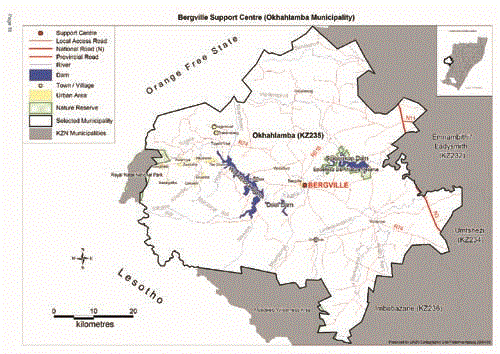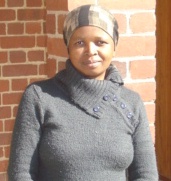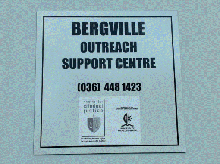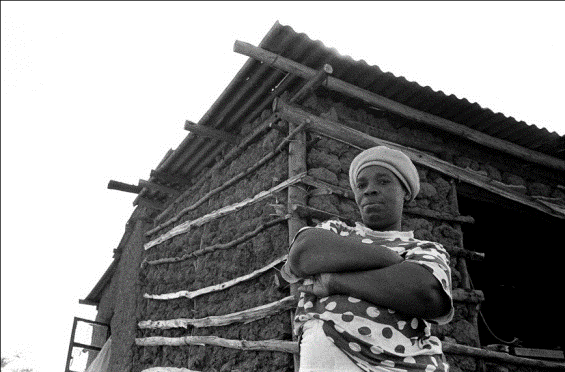 Coordinator: Tshengisile Dlamini. Tshengisile has worked for CCJ since 2011.
Coordinator: Tshengisile Dlamini. Tshengisile has worked for CCJ since 2011.
Tel/Fax: 036 448 1887
Email: Bergville.ccj@gmail.com
District: Uthukela District Municipality (Northern KwaZulu-Natal)
Area covered: 3 483sqkm
Population: 137 525
Most common cases: Legal advice and domestic violence
Communities served:

Bergville, Woodford, Bethany, Rookdale, Hambrook, Acton Homes, Greenpoint, Langkloof, Emaus, Ntulwana, Mamfemfetheni, Ngoba, Dukuza, Moyeni, Zwelisha, Amazizi, Bonjaneni, Mhlwazini, Didima and Singatha.
Description:
Bergville is a rural town surrounded by farms and traditional communities. Although some people are employed on the farms, the majority are without work.
Some infrastructure is in place but not serviceable. For example, the new pipes have no water so people still use wells, while some areas have no roads. Health facilities rely on mobile clinics which come once a week to each community, weather permitting.
The support centre (left) is at the police station, and is accessible for town residents, but not for the rural population - as roads are poor and transport scarce and expensive.
In 2011, the office attended to 223 cases. The most common were legal advice (75) and domestic violence (72).
Tshengisile Dlamini
 How long have you worked for CCJ?
How long have you worked for CCJ?
Since 2011
What led you to work for the CCJ?
As a person whose interests are to assist people, mostly the disadvantaged, in my eyes CCJ was the place to be as it has the resources needed and also it allows a person to spread his or her wings on her job.
What are the most common problems that clients come to you with?
Domestic violence, irreparable marriages problems and maintenance
How do you deal with cases of domestic violence?
After I have heard from the victim of the act, I call the perpetrator to present himself (I say 'him' because most of the time the perpetrators are men). After hearing the story from both sides, I call for mediation where both parties will be available. During the mediation process I give the parties suggestions, and it is for them to come up with a decision. If that fails, I refer the victim to the court to apply for a protection order.
Are there any laws that you would like to see changed?
None. For me there is nothing wrong with our laws, only the mindset of our people. People read the words that are said to be the laws and use it as raw as it is, sometimes wrongly. In order to see exactly what the law is saying you should apply your mind to it.
How do you balance your work with traditional customs?
As I have indicated above, our South African laws and traditional customs are not clashing that much, the problem lies to the person who is exercising or implementing the laws. If a case relating to customary practices come to the office, what I look into first is how it was implemented, and whether they followed the right procedure?
Have the attitudes and behaviour of people in Bergville changed since you have been here?
A little bit. Some men have changed their behaviour and treat their women with more respect. Men are still afraid to come to us to report their problems though.
What advice would you give to children in Bergville?
I would advise them about the importance of education. They must leave the luxurious things aside and concentrate on their studies. I will also add that they must obey their elders as all the blessings will come from them.
Who is your role model?
I have no role model at present except my father, who has passed away. He used to tell me the truth and all his scenarios that he gave me, I experience them in my daily life. When he was alive I saw him as a rude person, but I can see now that he was shaping me to be who I am today.
What are the particular challenges that you face in your work?
Sometimes the respondents, especially for maintenance, are rude. They refuse to listen to the instruction you give them to come to the office. When you call them either they ignore the calls or answer in an intolerable manner.
Can you tell us about a case that was particularly rewarding for you?
It was a case where I was helping the widow whose husband was in a tractor accident. The husband was on duty that day, and on the previous day it had snowed a lot. He was instructed to drive a tractor from one farm to another. Unfortunately for the poor man, the tractor lost control and it crashed. He tried to jump off but part of his trouser get caught on the tractor's gear. He died on the scene. As usual, the employer paid for all the funeral costs, which was something wonderful to the widow.
A few months' after the funeral, I heard that the widow had approached the employer to give her a job in order to support the family and she was working like a slave. That is when a neighbour approached me to intervene. I firstly approached the widow and explained to her about the compensation she is entitled to from the Department of Labour. I told her to give me all the details of the deceased and of the farm. I explained that I will first enquire from the Dept. Of Labour whether the matter was reported or not. We then followed all the instructions given to us by the Labour Dept. In the end, the widow was compensated with R45,000 as a lump sum, and was told that she will receive the monthly payment that her husband earned when he passed away until she reaches the age of 60. Also the children will get a certain amount every month too, until they reach 18. Is not that rewarding?